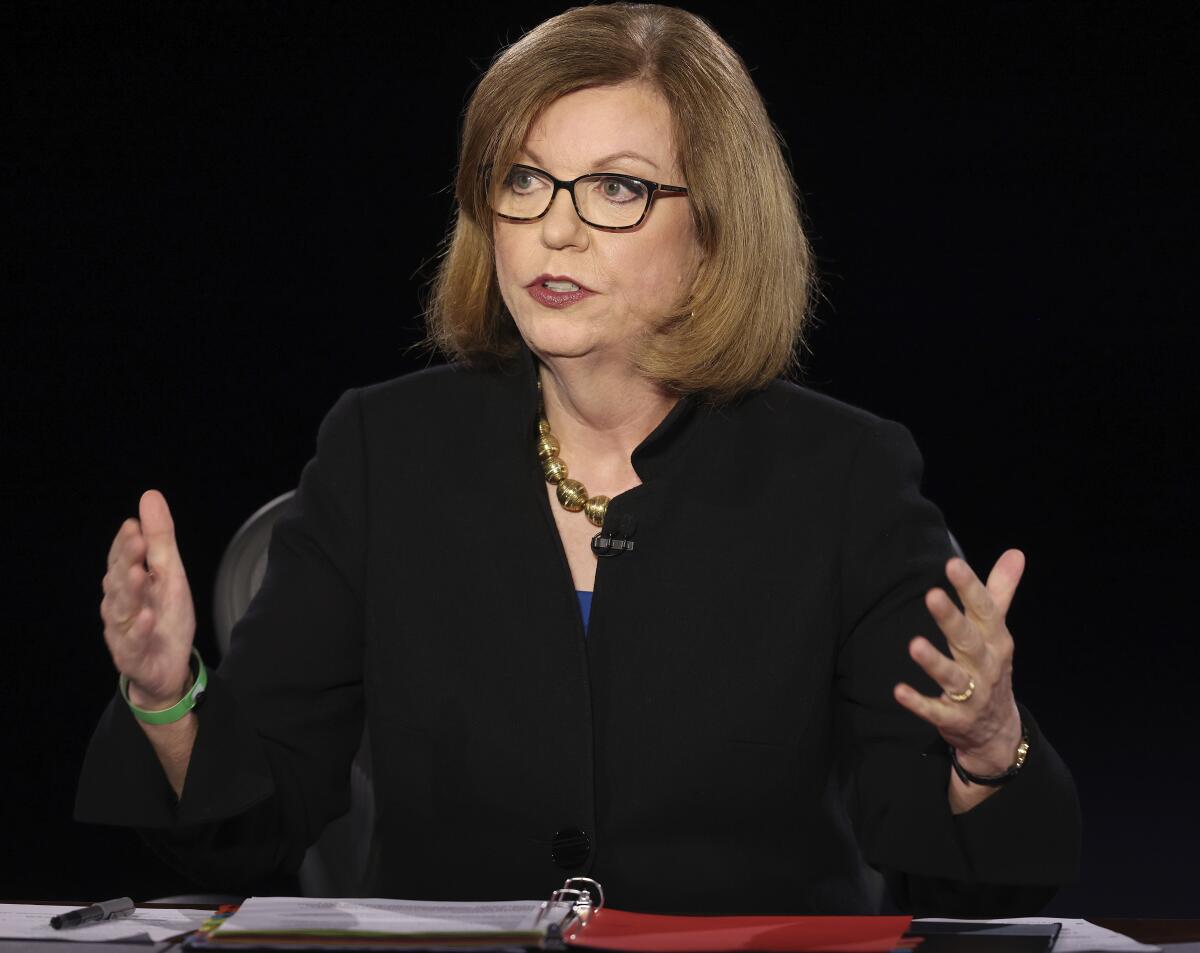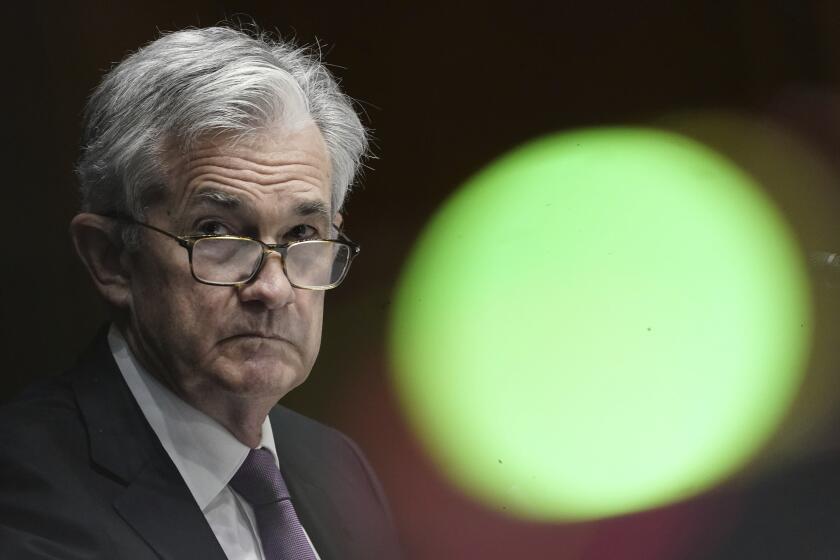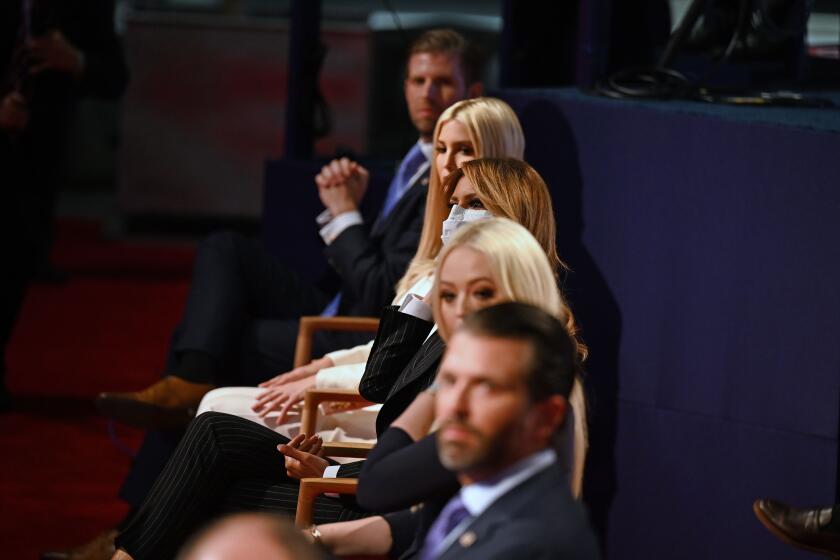Opinion: President Trump wonât interrupt at next weekâs debate â because he wonât be there

I canât decide whether to fault President Trump for pulling out of next weekâs debate with former Vice President Joe Biden, or extend the thanks of a grateful nation. But after two sessions that insulted the intelligence of American voters, Iâm leaning toward the latter.
The Commission for Presidential Debates announced early Thursday that, out of an abundance of caution, the Oct. 15 debate would be staged virtually instead of indoors at the Adrienne Arsht Center in Miami. The town-hall format had called for the candidates to be questioned by members of the audience, which raised the risks of a coronavirus outbreak.
Biden agreed to the change. Trump did not, saying in an interview on Fox Business, âIâm not going to waste my time on a virtual debate. Thatâs not what debating is all about.â Instead, the president â whoâs still taking the steroid dexamethasone for his COVID-19 infection â will hold a campaign rally.
Iâll admit, I was looking forward to watching Trump position himself on the stage in Miami to loom ominously in the background whenever Biden answered questions, as Trump often did to Hillary Clinton during their town-hall debate in 2016. The virtual format wouldnât allow that, which may have made it less appealing to Trump. His poll numbers tanked after the first debate, which may have been another factor in his decision to withdraw.
As with his own bout with COVID-19, Trump evidently thinks the country is winning its battle with recession.
But hereâs why I am kind of grateful that Trump is putting the kibosh on taking part in next weekâs debate, at least for now. (Trump has a habit of shifting positions like a weather vane; and, as if on cue, his campaign reversed itself Thursday morning and said the next two debates should indeed be held â but a week later and in person. No word from the Biden campaign yet on whether it would agree.)
The gamesmanship displayed by Trump last week and by Vice President Mike Pence during Wednesdayâs vice presidential debate has received a lot of attention, which it deserved because it was extreme. But the most frustrating aspect of the debates has been how unenlightening theyâve been. Given repeated opportunities to distill for Americans their differences and their plans for the next four years, the candidates have largely whiffed.
After the smoldering wreck of the Trump-Biden dust-up, many observers expected the debate between Pence and Sen. Kamala Harris (D-Calif.) to be far more policy oriented and productive. Moderator Susan Page of USA Today held up her side of the bargain, posing pointed, potentially revealing questions about a series of major issues. Instead of answering, however, the candidates delivered the broadsides their campaigns wanted them to deliver.
Nowhere was this more obvious than when Page noted how Trumpâs doctors had given misleading or evasive answers about the presidentâs health in recent days, and asked whether the public had a right to know more. Pence praised the care Trump received, said âthe transparency that they practiced all along the way will continue,â and then thanked Biden and Harris for their expressions of concern. It was probably his most graceful dodge of the night.
Given the opportunity to list the many open questions about Trumpâs health and the damning implications thereof â for example, âWhy wonât he say when he last tested negative for the virus?â Or, âWhy did he receive the sort of treatment usually given to COVID-19 patients who had much worse symptoms than he disclosed?â â Harris pivoted immediately to Trumpâs income taxes. Seriously. His taxes.
Just as infuriating was the discussion of what would happen if the Supreme Court overturned Roe vs. Wade. Page asked Pence, the former governor of Indiana, what restrictions on abortion heâd like to see that state impose. He first talked about foreign policy, then about whether Trumpâs last-minute Supreme Court nominee, Amy Coney Barrett, would see her religious views challenged by Harris and other Democrats on the Senate Judiciary Committee. It was forehead-slappingly bad.
A mandate to wear a face mask is only as good as its enforcement. And so far, thereâs been very little enforcement.
He later came back to the issue, but only to declare how âpro-lifeâ he and Trump are. But what does that mean in terms of restricting the right of a woman to obtain an abortion? Does he want them to be illegal in all circumstances? Does he want doctors and nurses who perform them to be prosecuted? Does he want to outlaw the morning-after pill and other drugs that abortion opponents view as abortifacients? Even if you watched the debate with the intensity of a cat eyeing a squirrel, you would still have no idea.
Then Page asked Harris what she would want to see from California, a state that enshrines the right to privacy in its constitution and by statute guarantees access to abortions. She said, âI will always fight for a womanâs right to make a decision about her own body,â but then shifted to talking about how the Trump administration was urging the Supreme Court to strike down the Affordable Care Act. Thatâs important, granted, but Harris gave viewers no idea how far she believed the right to an abortion should extend.
So Pence, the next time he spoke, answered for her: âJoe Biden and Kamala Harris support taxpayer funding of abortion all the way up to the moment of birth.â Is that true? Harris didnât respond, leaving viewers â and voters â to wonder.
If the public has a right to know anything, itâs what the candidates plan to do on issues that are vitally important to them. And these debates have failed to offer much on that front. So do we really need more of them?
More to Read
Updates
9:44 a.m. Oct. 8, 2020: This afticle was updated with the announcement from the Trump campaign that it wanted the next two debates to be postponed, not canceled.
A cure for the common opinion
Get thought-provoking perspectives with our weekly newsletter.
You may occasionally receive promotional content from the Los Angeles Times.













